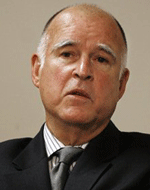 There is a nine billion dollar hole that the state is going to have to fill. How it chooses to fill it will depend more on the decision of voters than it will on the legislators.
There is a nine billion dollar hole that the state is going to have to fill. How it chooses to fill it will depend more on the decision of voters than it will on the legislators.“The stark truth is that without some new taxes, damaging cuts to schools, universities, public safety and our courts will only increase,” the Governor said. “With the tax program, we will eliminate the budget deficit finally, after years of kicking the can down the road.”
If the tax measure passes, K-12 schools and community colleges will receive about $4.8 billion more than they received this year – a 10 percent increase – after years of eviscerating schools.
But if taxes fail, UC and CSU face an additional $200 million in cuts – meaning more burden shifted to student tuition.
The budget also looks to slash something on the order of 3000 state jobs and merge departments.
Most of those cuts would be from the Department of Corrections and Rehabilitation, though the savings would be just a tiny fraction of the overall budget deficit.
The biggest cuts would take place regardless of the tax increases, as the Governor is asking for an additional $4.2 billion in cuts which includes $946 million to welfare-to-work and $447 million to subsidized child care.
“In January of 2011, I proposed a budget that combined deep cuts with a temporary extension of some existing taxes. It was a balanced approach that would have finally closed our budget gap. In the end, the taxes were not extended and massive cuts – totalling $16 billion – were enacted,” the Governor said.
“The 2011 budget did, however, lay the foundation for fiscal stability. It cut the annual budget shortfall by three‑quarters – from $20 billion to $5 billion or less. It shrunk state government, reduced our borrowing costs and gave local governments more authority to make decisions,” he added.
“I will ask the voters to approve a temporary tax increase on the wealthy, a modest and temporary increase in the sales tax and to guarantee that the new revenues be spent only on education,” the Governor announced. “I am also asking that the voters guarantee ongoing funding for local public safety programs. This ballot measure will not solve all of our fiscal problems, but it will stop further cuts to education and public safety and halt the trend of double‑digit tuition increases.”
The Governor further added: “My budget plan also includes important reforms. It improves government efficiency and pays down debt. It reorganizes state government to make it more efficient and saves tax dollars by consolidating or eliminating functions. It restructures social service programs to better support working families. It gives substantially more flexibility and decision‑making to local school districts. The plan also calls for bold investments in our future: to assure a reliable water supply, build high speed rail and reduce greenhouse gas emissions.”
Republicans were quick to attack the plan.
Dan Schnur, a former GOP strategist who now heads the Jesse Unruh Institute of Politics at the University of Southern California called the budget proposal “the largest ransom note in California political history.”
“Brown is essentially telling voters to either support his initiative or there’s going to be three fewer weeks of school next year,” he added. “There’s no guarantee of success, but this is probably the most politically viable course he could take to build support for the initiative.”
Other criticized the Governor’s tax plan, arguing that the state deficit has already been shrinking on its own as the economy recovers and the tax increase could harm that improvement.
Republicans were not the only ones critical of the plan. Democratic leaders believed the cuts too deep and draconian, and maybe unnecessary if tax revenues continue to increase.
Senate Leader Darrell Steinberg issued a statement on Thursday stating, “Together, we have made a giant dent in a once overwhelming budget deficit. The price has been high for students, working families and those struggling to improve their lives. Those cuts have real consequences on the lives of real people, and I am wary of immediately continuing down that path.”
He added, “Between revenue estimates by the Legislative Analyst’s Office in November, and the Department of Finances numbers in December, projected revenues increased $1.5 billion. If that trend continues even slightly, we may avoid the need to make the kinds of cuts the Governor now suggests. While in the end we may have to cut more, doing it now should be a last resort.”
Speaker John Perez was more guarded in his comments.
“The Governor’s budget plan reflects the fact that even though California’s economic recovery is gaining strength, we still face a year of difficult choices,” the Speaker said in a statement on Thursday. “His plan underscores the need for new revenues to avoid cuts that will be a major drag on the recovery, and I am looking forward to working with the Governor and my colleagues to produce an on-time budget that reflects California’s values by our June 15th deadline.”
Locally Assemblymember Mariko Yamada said, “Today’s early budget release was unexpected, but the cuts contained in it are no surprise. The signs of economic recovery are optimistic, but we still face difficult choices.”
Like many, however, she is concerned about the impact of additional cuts to social services and welfare.
“I remain concerned about the deep cuts to safety net programs that support people suffering job loss, disabilities, and poor health. Over $2 billion in cuts to CalWORKS and Medi-cal programs will only hurt the poorest among us, specifically women, children and the elderly. An additional $302 million from CalGrant scholarships targets our young people at a time when education costs are soaring,” the Assemblymember stated.
She added, “We must have an honest revenue discussion to address ongoing structural deficits in order to protect the most vulnerable from future cuts.”
Senator Leland Yee, a strong defender of students, was more hopeful about the addition of taxes on the wealthy. “I am pleased to see the Governor put forward a budget that includes new revenues, especially the proposal for the wealthiest among us to pay their fair share. I am hopeful that through further revenue increases, a slowly improving economy, and our budget negotiations, we can ensure that schools are not cut and critical services are protected.”
The Vanguard will have a more thorough analysis of the budget impact in several key areas over the next few days.

It all sounds nice, but when it doesn’t pencil out in the ultimate end, what then? Just a rhetorical question…
I’m not sure I’m following you: they will either have to pass the tax cuts or massive new cuts. That’s not something I think sounds nice. But that’s me.
[quote]I’m not sure I’m following you: they will either have to pass the tax cuts or massive new cuts. That’s not something I think sounds nice. But that’s me.[/quote]
Sorry, was too cryptic in my comment and should have been a bit more explicit. Let me reword: It all sounds nice to tax the rich/increase the sales tax to pay for education/social services, but when the additional tax revenue generated by taxing the rich/increasing the sales tax doesn’t pencil out in the ultimate end to cover the costs claimed, what then? Does that make more sense?
In other words, from what I’ve read, taxing the rich is not going to make much of a dent in state/federal budget problems. I honestly don’t know if that is true, but I would guess it might be. As for upping the sales tax, what sort of repercussion will that have? More on-line sales to avoid the tax; less businesses coming to CA; hitting the poor harder, etc. I’m not convinced that this tax increase solution is going to be helpful, and perhaps do more harm than good…